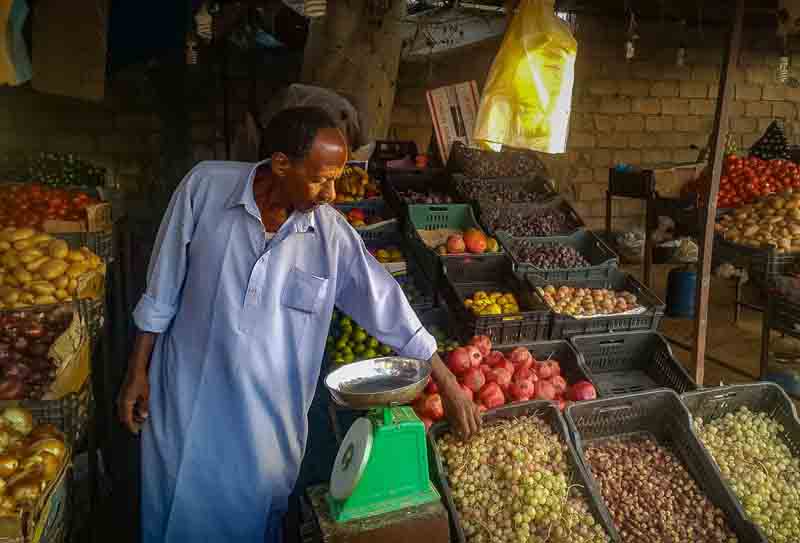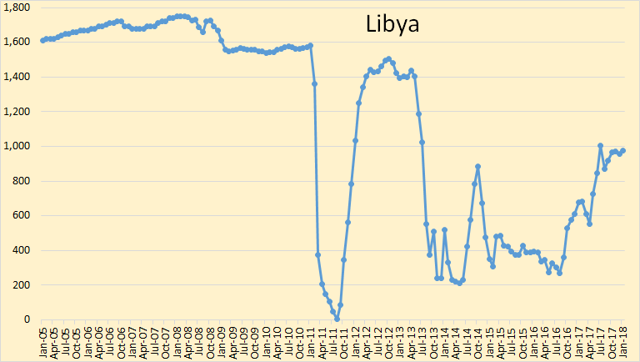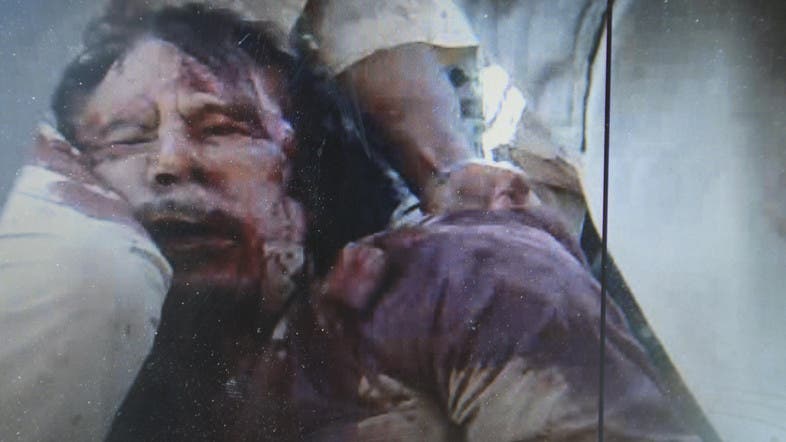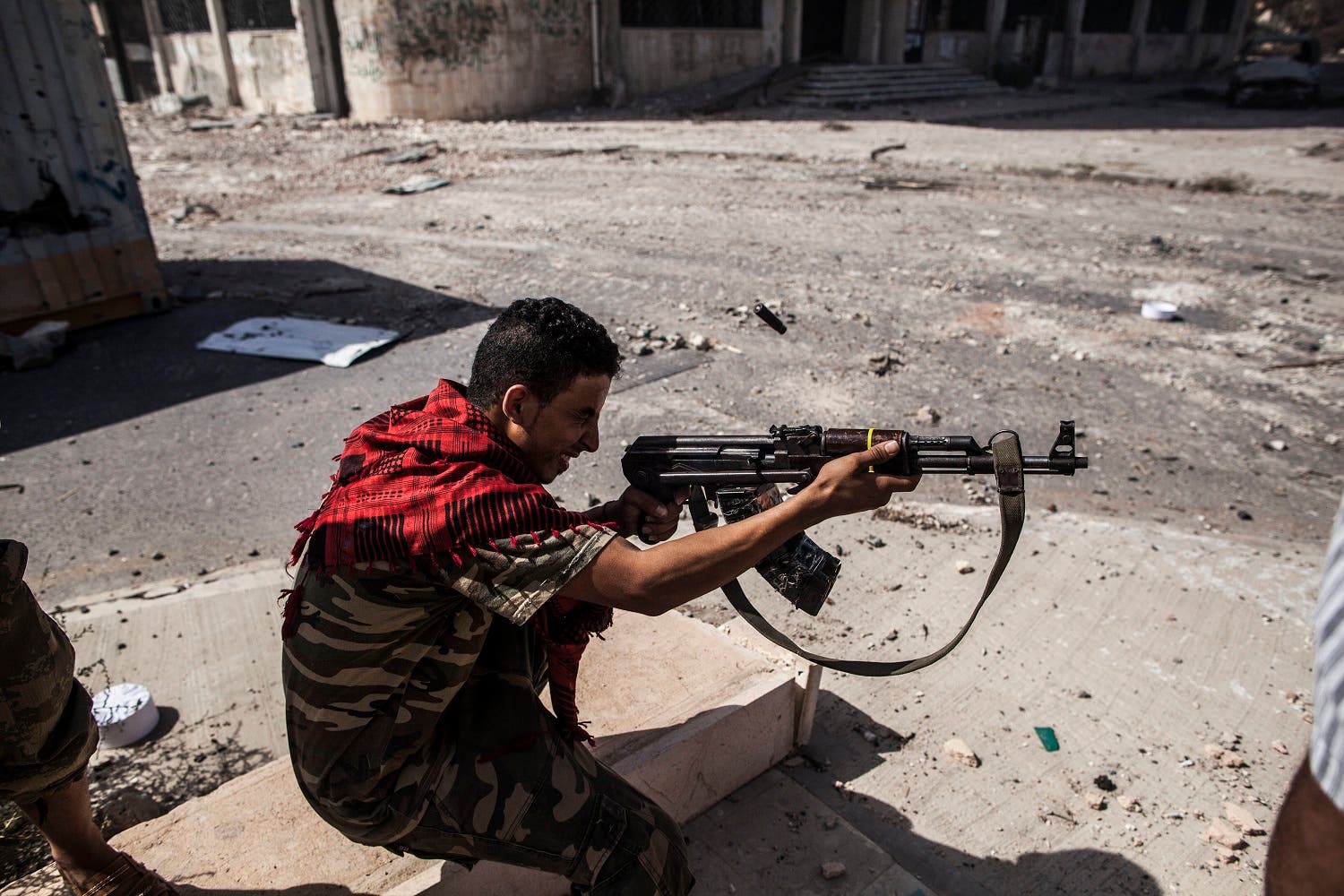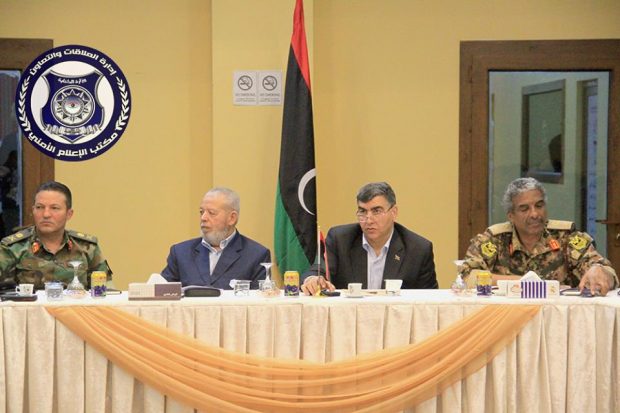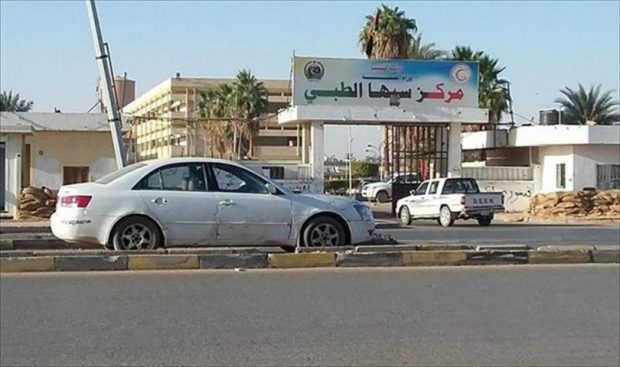
http://www.defenseone.com/threats/2018/02/when-islamic-state-came-libya/145920/
TRIPOLI—As U.S. military forces hunt down the remnants of the Islamic State in Syria and Iraq, they are also waging a quieter campaign in the fractured country of Libya. Conducted primarily from the air and through special-operations personnel based in the western city of Misrata, the effort aims to eradicate cells of fighters who fled the group’s stronghold in the central city of Sirte before its fall to Libyan forces in December 2016.
According to Libyan officials I spoke with in December, these cells number around 500. They include capable leaders and planners who comprise what ISIS calls its “Desert Brigade” and its “Office of Borders and Immigration,” a section responsible for external operations, logistics, and recruitment. Moving along the shallow valleys south of Sirte, the network has already conducted a number of attacks on checkpoints and convoys and, most recently, against an oilfield. It is also reconstituting itself. A burly 38-year old jihadist from the Libyan town of Bani Walid named Malik al-Khazmi reportedly helps lead the recruitment drive. Libyan officials believe he played a pivotal role in the rise of ISIS in Libya.
One of the Libyans he recruited is a young man I’ll call Ahmed who I met in 2016. In many ways, Ahmed’s path to jihad paralleled his country’s dissolution after the fall of dictator Muammar Qaddafi. And, when compared with the career of another jihadist 20 years his elder, it also underscored the recurring factors that continue to push successive generations of youths toward militancy.
Born in 1996, Ahmed grew up comfortably in Janzur, a seaside settlement on Tripoli’s western edge. Then came the oil boom, and along with it, a rush of migrants from the hinterland. Janzur soon expanded into a suburb of the capital, complete with gated “tourist villages” and an American school favored by diplomats.
In 2013, Ahmed entered the University of Tripoli to study engineering. He was not religiously observant back then. He smoked cigarettes and drank bokha, a potent home-brewed alcohol. His first semester in school was a time of dislocation and questioning, wrought by turmoil in Libya and across the region. The uprising in Syria gripped him; its parallels to the struggle against Qaddafi were obvious. “We’d suffered, and we knew the Syrians were suffering too,” he told me.
Ahmed watched the Syrian war from afar, on the Internet and on Saudi satellite stations. He recalled popular Saudi clerics beseeching their audiences to support the revolution. It was a religious obligation, they said, incumbent upon all believers. But these arguments alone did not persuade him—it took a horrifying atrocity to do that. In the pre-dawn hours of August 21, 2013, a Syrian Republican Guard artillery crew in Damascus launched volleys of sarin rockets into the city’s eastern neighborhood of Ghouta. U.S. government estimates put the civilian death toll at over 1,400. Ahmed was outraged. “After Ghouta, I really decided,” he told me.
Getting to Syria wasn’t hard. A Syrian man in Tripoli gave Ahmed the information for a contact in Turkey. “Call this guy,” he said, “he will tell you where to go.” Once he made it to Aleppo, Ahmed joined a small militia of Libyan fighters who had joined Syrian Salafist groups; some, like the Nusra Front, were linked to al-Qaeda. They encamped on farmlands dotted with grain silos and transmission towers, where Ahmed trained on a 14.5-mm gun.
In October 2013, the Syrian army launched an armored blitz aimed at choking off Aleppo and cutting the rebels’ supply lines to Turkey. The Libyans fought in the battle of Brigade 80, an army base near the international airport, then retreated north to Tiyara, a hamlet of beehive homes and olive groves. Here, Ahmed manned the defenses of an old factory that the rebels had taken, just east of a hill where Hezbollah snipers and Syrian soldiers had the commanding heights. One day, a Libyan fighter next to him—a childhood friend from Janzur— fell dead after being shot in the head. And so in December of 2013, a shaken Ahmed decided to leave the front. But leaving Syria would prove much harder than entering.
In January 2014, the rebels fell into factional fighting. Ahmed barely escaped with his life, crossing west until he reached the Turkish border. By February he was back in Tripoli, safe and exhausted. But he wasn’t finished with war. In the summer of 2014, the capital was consumed by the civil war between the so-called “Dawn” faction, comprised of militias from western towns led by Misrata and some Tripoli neighborhoods and Islamists, and the “Dignity” faction, led by General Khalifa Hifter in the east, which included forces from the western mountain town of Zintan. Ahmed joined a militia from Janzur, fighting on the side of Dawn.
One day in October 2014, in the midst of the fighting, seven Libyans, some of them veterans of the Syria war, arrived at the abandoned headquarters of a Tripoli TV station that Ahmed and his fellow fighters were using as a camp. One introduced himself as Malik al-Khazmi and proceeded to pitch them to join the Islamic State, Ahmed told me. “The dawla [or state] is coming to Libya,” al-Khazmi told them. “Don’t you want to be the first? The nucleus?” He answered yes.
Around the same time that Ahmed was joining ISIS in Tripoli, another Libyan some 450 kilometers to the east was making the same pledge. Born in 1976, Fawzi al-Ayat is 20 years older than Ahmed, with a much longer record as a jihadist. Like Ahmed, though, he told me his career began when a foreign conflict compelled him to travel abroad to defend Muslims.
Fawzi grew up in Sirte, the city now famous as ISIS’s Libyan base, and as Qaddafi’s hometown and a bastion of loyalist sympathy. Long before that, the city boasted a rich and complex social identity, comprising multiple tribes and an ancient history. In the first century, it was “a large coastal city with brick walls … date palms and sweet-smelling springs,” as a visiting Andalusian geographer wrote. But in the centuries that followed, Sirte, a middling town linked by trade to the desert south rather than to the east or west, faded to the margins. Qaddafi would eventually change this, building it up as an enclave for his favored tribes and elites, dispensing funds on villas, a university, a hospital, and the iconic Ouagadougou Center, a staggering conference hall named for the capital of Burkina Faso.
Today, vast swathes of Sirte’s downtown are in shambles. Though the Libyan-led victory last year over ISIS dealt a serious blow to the group, the city faces a dubious future. On a visit to the city in December, I passed by block after block of flattened buildings and piles of ashen debris. Reconstruction has been slow and displaced residents are furious. “I am ready to swim to Europe,” a young man told me.
All this was a far cry from the city that Fawzi knew as a young man. Still, despite the attention Qaddafi lavished on them, Sirte’s residents were not exempt from his redlines. And in 2007, Fawzi crossed one of them.
At the time, Fawzi was 31, married, and working as an engineer at the national electrical company. Yet like other young Libyan men, the ongoing U.S occupation of Iraq seized him. He said he was never part of any organized jihadist or opposition group, but was planning to travel to Iraq on his own to fight the Americans, when the Libyan government arrested him. He spent the next 17 months in Tripoli’s notorious Abu Slim prison, the site of a massacre in 1996 where over 1,200 inmates died. Though torture in the prison was rampant, by the time of Fawzi’s incarceration, the Libyan regime was supporting a process of theological “revisions” to convince imprisoned jihadists of the illegitimacy of political violence.
It didn’t work for Fawzi. When he was released in 2009, he emerged more radical than ever, and in 2011 he fought against Qaddafi. Afterwards, he founded a jihadist militia called Ansar al-Sharia. By this time, Sirte had fallen into neglect and desperation—punishment, many said, for its long association with Qaddafi. Revolutionaries from the nearby city of Misrata took revenge on the city with detentions and executions, upsetting its social balance by repressing some tribes while favoring others. Crime, drug use, and bloody score-settling spiked. Without a police force, Sirte was open for someone to impose order, even a radical form of order.
Fawzi told me he helped form Ansar al-Sharia, or “the Partisans of Islamic Law,” to do just that. (It shares its name with several other al-Qaeda-inspired Islamist movements. An identically named and better-known militia had also formed in Benghazi, but Fawzi maintained his group arose spontaneously and independently from this one.) It quickly took over security in Sirte and won plaudits for battling drug dealers and mediating land disputes. Meanwhile, another foreign battlefield beckoned.
By this time, a faction had begun developing within Fawzi’s group that wanted to abandon the gradualist approach of al-Qaeda ideologues and establish a territorial caliphate immediately—one that would include Libya. He recalled listening in 2013 to Turki al-Binali, a gifted Bahraini orator, deliver exhortations in Sirte’s Rabat Mosque; al-Binali would become one of the Islamic State’s most important preachers. Libya’s worsening political conflict also weighed on Fawzi: He worried that the Dignity operation, the eastern Libyan forces led by General Khalifa Hiftar, would soon attack Sirte—especially since Hiftar’s tribe, the Firjan, had a presence in the city. Pledging loyalty to the ascendant Islamic State would bring protection, he believed. And by the fall of 2014, he committed to travel to Syria to do just that.
But when Fawzi arrived in the Islamic State’s de-facto capital of Raqqa along with three other Libyans, the group’s leadership instructed him to return home. ISIS, they were told, had already dispatched three lieutenants to the North African state. So Fawzi and his group returned to Libya. And at the end of 2014 in Sirte, he took an oath of allegiance to the Islamic State.
Today, Fawzi sits in a makeshift prison at an air force academy in Misrata, where I met him in December. His cell is a converted dormitory room he shares with several other inmates, sealed by a heavy steel door with a narrow slit. He is tall with a shaved head. His once-luxuriant beard is gone. When speaking, he tilts his head to one side to compensate for the left eye he lost from an American airstrike on Sirte in the summer of 2016. All that remains is the sutured socket.
Fawzi was captured in Sirte that fall after fierce fighting, just after a close ISIS confidante named Walid Firjani killed himself in a suicide bombing. Fawzi said it was Firjani who appointed him to serve as a sharia judge during the Islamic State’s reign in Sirte, covering personal status law—hereditary matters and marriage and divorce.
The Misratan prison official who escorted me told me Fawzi and other ISIS fighters are awaiting trial. But Libya’s judiciary has been in disarray since the revolution and its prisons are, in many cases, the preserve of militias, with scant regard for due process. The official did not see any hope for rehabilitating the captured jihadists, along the lines of what Qaddafi tried. “They will never change,” he said.
This is not the attitude back in Tripoli, however. Here, a militia that passes for a counter-terrorism force is running an extensive re-indoctrination effort, rooted in Islamic scripture and jobs training. The program is run from a prison on the northern end of Matiga International Airport, where hundreds of ISIS fighters or suspected fighters are kept, along with common criminals and individuals caught on the wrong side of Libya’s factional divide. The prison is not controlled by the Libyan government but by a man named Abdelroauf Kara, the commander of the Special Deterrence Force, one of Tripoli’s most formidable armed groups. He has emerged as the city’s de facto counterterrorism czar.
Just shy of 40 years old with a gaze of severe remoteness, Kara met me in early 2016 a conference room in his fortified compound at the airport. In an adjacent office, wispy young militiamen in lizard-stripe fatigues and Diadora trainers lounged on a couch watching a wide-screen TV. A box-fed machine gun rested on a bipod. Growing up in the nearby Tripoli neighborhood of Suq al-Jumaa, or “Friday Market,” Kara told me he worked as a metal artisan before the revolution. He is also an adherent of Salafism, the literalist, conservative interpretation of Islam, and sports the ample beard and shaved mustache of a practicing Salafist. His rise as a militia boss is part of a nationwide trend of Salafists taking over Libya’s policing functions.
After the fall of Qaddafi, Kara founded a militia to ferret out ex-regime loyalists. Then, since the Libyan police had all but disappeared from the capital’s streets, he tackled the drug trade: With the collapse of Libyan border control after 2011, a torrent of illicit narcotics had flowed into the country from the south and west. All the while, Kara’s opponents feared the vast power he was accruing.
The arrival of ISIS in Libya proved a further boon to Kara’s authority. While the campaign against its stronghold in Sirte was chiefly a military one, the battle against the group in Tripoli demanded intelligence and police work, using surveillance, informants, and nighttime raids. And Kara’s militia was the closest thing to a security service.
Kara brought onto his payroll ex-intelligence officers from the Qaddafi era with a talent for interrogations. His militiamen raided suspected safe houses. Each new arrest led to more raids, he told me, after interrogations and the analysis of data from seized cell phones. ISIS hit back, attacking Kara’s base and killing several of his men. Still, he insisted he was winning, and presented himself to Western powers as a counter-terrorism ally, especially after aligning himself with the weak United Nations-backed government in Tripoli. Kara’s biggest coup came last year, when he arrested the brother of Salman Abedi, a 22-year old Briton born to Libyan parents who blew himself up in Manchester in May 2017, killing 22 people at a concert. Believing the brother to be an accomplice, British authorities have asked repeatedly for his extradition.
Yet Kara’s power has not gone uncontested: In mid-January, another Tripoli militia attacked Kara’s base, seeking the release of prisoners. A mix of personal, ideological, and political rivalries underpinned the assault, which left more than 20 dead and shut down the airport for days. Despite such clashes, Kara has denied using the pretext of the Islamic State to go after opponents. And he has further refuted accusations leveled by the United Nations of abuses inside his prison, insisting he acted with justice and humanity. The proof, he told me, was his program of prisoner rehabilitation.
The morning after we met, I went to see this program, housed on Matiga airport near a half-finished soccer field. At 7:30 a.m. sharp, the prisoners jogged from their cells to breakfast, followed by classes on Islam. Some of them, my escort told me, had come to the prison on the recommendation of their families, for alleged drug use or for an array of behavior problems. Then there were the jihadists. “The Islamic State guys need special treatment,” he said.
Seated on a plush carpet before a cleric, they hunched over Korans and pamphlets written by religious authorities in Saudi Arabia. This dose of Salafist principles seemed to comprise the core of their counseling and treatment, though Kara said he addressed more worldly needs as well. After lunch, the prisoners took vocational classes: cabinet making, computer literacy, house painting, and electrical repair. All of this would help them “rejoin society,” my escort said.
I walked through the hives of activity, past the whine of buzz saws and fumes of lacquer to a small cantina where some young men were frying hamburgers. This is where I first met Ahmed. He’d been captured by Kara’s forces a few months earlier. When he made the pledge to Abu Bakr al-Baghdadi, the so-called caliph of the Islamic State, Ahmed had hardly expected this. He’d wanted to join a project; the Islamic State’s recruiter spoke of a borderless state, where Muslims lived peaceably with one another, apart from the unbelievers. He said he was well aware of its brutality, but that the recruiters marshaled an array of theological justifications. “They showed us verses from the Koran and the Prophet’s sayings,” he said. “You see? It’s all here.”
Now, the prison clerics tried each day to purge him of what he’d been told. Earlier, Kara had given me an illustration. “We tell the Islamic State guys, ‘Westerners in Libya who buy our oil are people protected by an ahd,” or Islamic covenant, he said. “They are not kuffar”— unbelievers.
Ahmed gave me an even simpler explanation. “I didn’t know the stories behind the sayings and the verses,” he said. “The Islamic State never told me the stories.”
In the end, it was local context that blocked the expansion of the Islamic State in Libya. Libyans had their own stories, and the terrorist group found it hard to graft its narrative onto the North African state.
Still, the paths to violence are varied and personal, often forged from narrow communities and peer groups. Common threads bind them: political and economic upheaval, foreign wars, and, especially, repression, corruption, and the absence of rule of law. The latter afflictions bedevil Libya today, under the countless militias who rule with impunity across the country. With no effective Libyan government and no capable police or security services, the chiefs of these militias present themselves to outside powers as counter-terror partners, much in the same way they have done in countering migration to Europe. The real challenge, then, is dealing with extremism in a way that does not empower these men at the expense of an inclusive, civic state.
The factors that pushed Ahmed and Fawzi toward militancy remain. And the cycle of mobilization may yet turn again.



